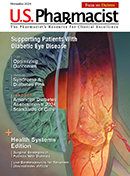Baltimore, MD—Based on small-sample studies of fewer than 200 patients each, hopes were raised that statins, among the most commonly prescribed medications, might reduce the risk of severe disease or death from COVID-19.
Not only did a recent study led by Johns Hopkins Medicine find that not to be the case, but it also identified some possible downsides of statin use in patients infected with the novel coronavirus. Researchers determined that statin use had no significant effect on mortality from COVID-19 but also found that patients hospitalized with COVID-19 who were taking statins had an 18% increased risk for having a more severe form of the disease compared with those not on cholesterol-lowering agents.
The study was published in the journal PLOS ONE.
“Despite the apparent beneficial effect of statins on the outcomes of various infectious diseases, our study revealed that their specific use to treat COVID-19 is probably not merited,” explained senior study author Petros Karakousis, MD, of Johns Hopkins University School of Medicine. “Compared with earlier research, we looked at a larger and more widely varied inpatient population, and had better criteria for defining disease severity, thereby enabling our results to be more relevant for predicting the impact of statins on COVID-19 outcomes in hospitalized patients.”
The authors said that they embarked on the study because of “an urgent need for novel therapeutic strategies for reversing COVID-19-related lung inflammation. Recent evidence has demonstrated that the cholesterol-lowering agents, statins, are associated with reduced mortality in patients with various respiratory infections. We sought to investigate the relationship between statin use and COVID-19 disease severity in hospitalized patients.”
The study team conducted a retrospective analysis of COVID-19 patients admitted to the Johns Hopkins Medical Institutions between March 1, 2020, and June 30, 2020. They specifically examined mortality and severe COVID-19 infection, defined as a prolonged hospital stay of more than a week and/or invasive mechanical ventilation.
Of the 4,447 patients who met inclusion criteria, 594 (13.4%) were taking statins on admission; more than one-half of those (57.2%) were male. Researchers also noted that the mean age was higher for statin users compared with nonusers (64.9 ± 13.4 vs. 45.5 ± 16.6 years, P <.001).
The researchers calculated that the average treatment effect of statin use on COVID-19–related mortality was RR = 1.00 (95% CI: 0.99-1.01, P = .928), whereas its effect on severe COVID-19 infection was RR = 1.18 (95% CI: 1.11-1.27, P <.001).
“Statin use was not associated with altered mortality, but with an 18% increased risk of severe COVID-19 infection,” the authors concluded.
The authors suggested that future studies seek to better understand how statin use affects COVID-19, especially the trend toward more serious cases. “One plausible explanation for this finding is that statins increase cellular production of angiotensin-converting enzyme 2 [commonly known as ACE2], the receptor on a cell’s surface through which SARS-CoV-2 gains entry,” Dr. Karakousis posited. “Therefore, statins may lower a cell’s resistance to infection and in turn, increase the odds that the patient will have a more severe case of COVID-19.”
“All of the studies published to date, including ours, have been retrospective—and that means no matter how hard one tries to eliminate factors associated with poor COVID-19 outcomes other than statin use, some may still be at work,” Dr. Karakousis added. “For example, there’s the fact that many statin users also are overweight, have diabetes or experience high blood pressure—all things that can impact the severity of COVID-19 on their own.”
The content contained in this article is for informational purposes only. The content is not intended to be a substitute for professional advice. Reliance on any information provided in this article is solely at your own risk.





